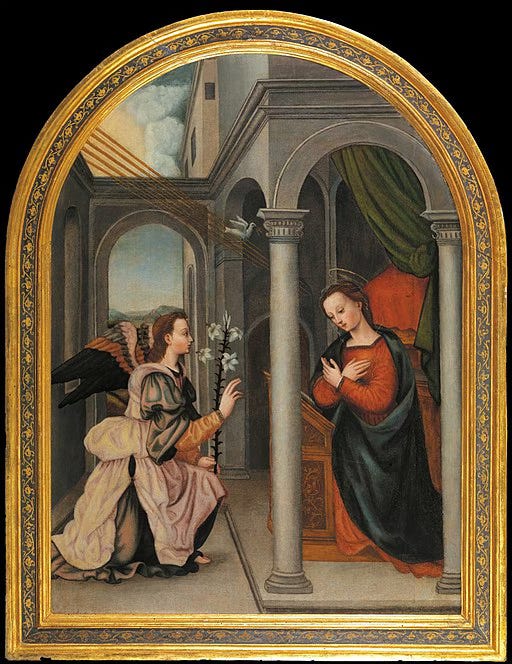
Today is the feast of the Annunciation, once known as Lady Day and (falling as it does, not by coincidence, on or around the vernal equinox) for many centuries the first day of the new year. I wrote this in my journal this morning:
“Even in arid spiritual times this day has always held a kind of fascination for me, and has led me to write at least a couple of poems inspired by the subject.
Why, when I haven’t even been to church since the first Sunday of Lent do I now feel drawn to that story — so implausible — of God asking a woman to be his mother?
The Office of Readings for today includes a letter from St Leo which says, “though Creator and Lord of all things he chose to be one of us mortal men. Yet this was condescension of compassion, not the loss of omnipotence.”
The word ‘condescension’ invariably has negative connotations in current English, yet “the condescension of compassion” speaks of something remarkable when the etymological roots and earlier meanings of ‘condescend’ are considered. The first definition in the OED is simply: ‘to come down voluntarily’, and the range of related meanings are almost opposite in tone to the ‘patronising’ sense the word usually conveys today (a sense which was only added to the OED in 2024, with only a single citation from before the 20th Century). These senses include, ‘to stoop voluntarily and graciously’; ‘to depart from the privileges of superiority by a voluntary submission’; to yield or deferentially give way’.
However much literal and historical, physical and biological truth there may be in the story of the Annunciation and , given Mary’s ‘fiat’, the consequent Incarnation, the narrative is spiritually and metaphorically powerful, and in any case I find the literal and metaphorical no longer as dualistically binary as I once did.”
I said, “this day has always held a kind of fascination for me”, but that ‘always’ isn’t quite true. Neither the mild Methodism into which I was christened and Sunday-schooled, nor the fervent Evangelicalism of my youthful conversion had much time for the nuances of the Christian calendar much beyond Christmas and Easter, and any hint of devotion to Mary was associated with Catholics who were not real Christians (indeed, I sincerely believed for a time that they were followers of the anti-Christ). In a comment on one of my early posts here, my niece, Vicky offered a set of prompts (which I promptly ignored) one of which was ‘Church and Chapel’. I suppose this post has become the beginning of a nod in the direction of that whole subject, which I have shied away from for a variety of reasons, which I might feel able to go into at some point. But not today.
Today, I tried to write a poem emerging from the thoughts in my journal but, finding only fragments, turned to reading what others have written (the best of which, unsurprisingly, was from Eleanor Parker aka A Clerk of Oxford). And then I remembered a poem that I wrote on one of the occasions when it was my turn to do the morning reading/prayer before staff briefing at McAuley School in Doncaster where I taught for most of my career. It turns out that it was exactly twenty five years ago.
The Annunciation
What happened that nine-month before His birth?
The ribbons of ornate Latin scrolling from
Renaissance paint, like multimedia texts
In waiting, tell so little - yet so much:
"Gratia plena" - but full of what else?
Was abstract 'grace' able to fecundate
A living ovum without human seed?
Or did the Spirit deign to be a cell?
Did cytoplasm, mitochondria
Flagellum, fuse into a gamete: God
Covered by a mother making God;
Divine and human zygotically yoked.
Is the quickening we feel a shade of that,
When the annunciation comes to us:
"The body of Christ"? And then we swallow Him
In gluten, starch, in alcohol and grape,
The fruit of her womb become fermented fruit
And milled, baked wheat: a God that we can eat
Returning then into the flesh he made
Which makes, in turn, incarnate, very God.





As someone who was born into non-denominational "religion", who adored their Baptist-leaning grandparents (my grandmother would have said "me too" to your Anti-Christ/Catholic summation), was "baptized" Lutheran as an adolescent (forced by my mother to receive a private Lutheran school fee waived). I shook off religion and church (beyond the Christmas holiday) in my twenties, preferring Agnostic to Athiest. And now, I belong to a UU church where all beliefs or no beliefs are welcome. Anyway, that's all to say that I think your poem is brilliant - especially the notion of God becoming a cell and the glutenous "body of Christ". Great work!